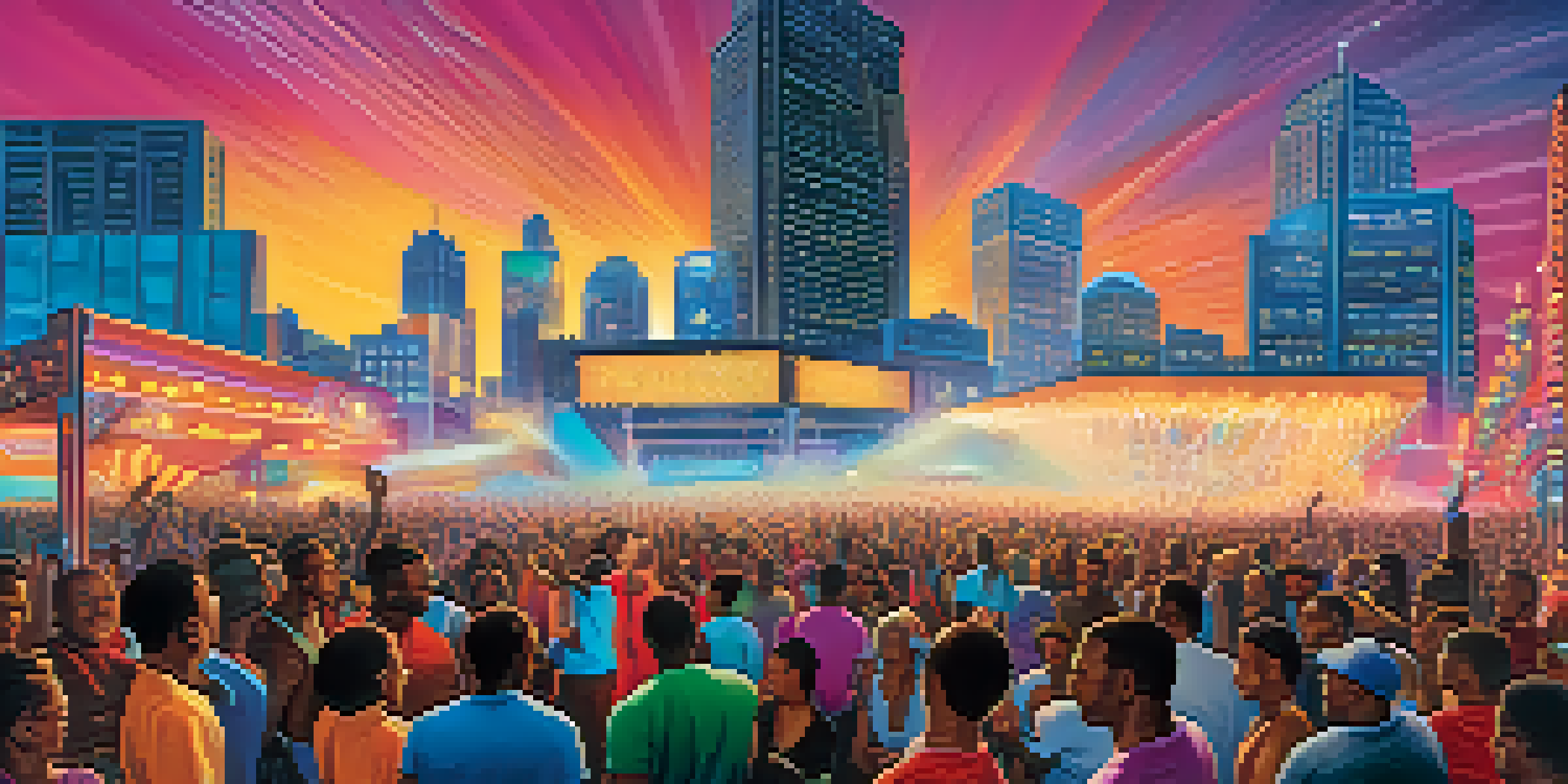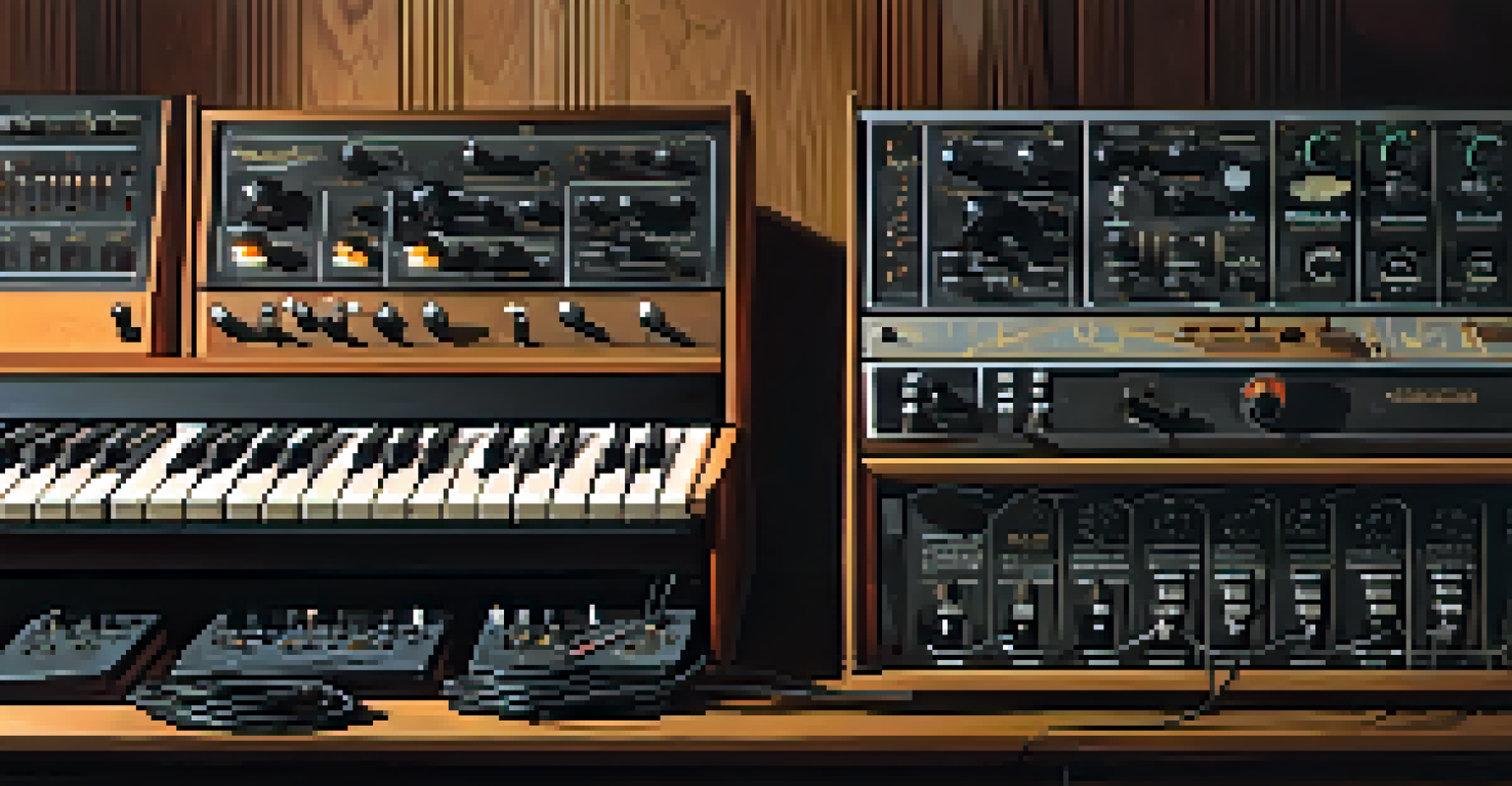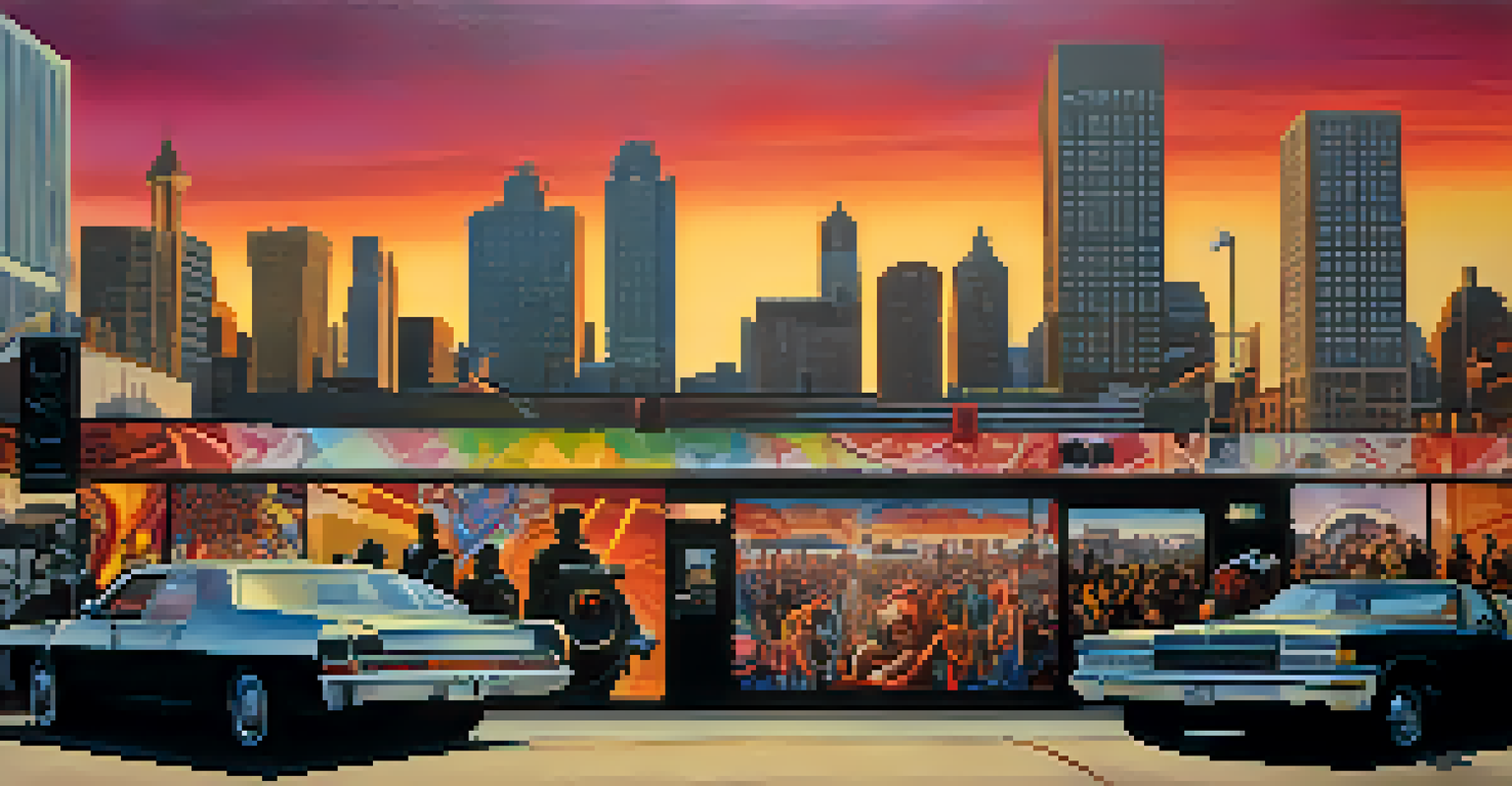The Global Reach of Detroit Techno: A Cultural Phenomenon

The Origins of Detroit Techno: A Musical Revolution
Detroit techno emerged in the 1980s as a unique blend of electronic music, drawing influences from funk, disco, and electronic pioneers like Kraftwerk. This innovative sound was a response to the socio-economic landscape of Detroit, marked by industrial decline and cultural transformation. The genre was birthed by artists such as Juan Atkins, Derrick May, and Kevin Saunderson, who are often referred to as the 'Belleville Three', and they laid the groundwork for what would become a global phenomenon.
Techno is the soundtrack of a city that has faced adversity and turned it into art.
As these artists experimented with synthesizers and drum machines, they created tracks that resonated with the urban experience, capturing the essence of the city’s struggles and aspirations. Their work not only defined a genre but also positioned Detroit as a cultural epicenter for electronic music. This musical revolution was not just about sound; it was about identity, community, and the power of creativity in the face of adversity.
The emergence of Detroit techno marked a pivotal moment in music history, where a city’s narrative was transformed into a genre that spoke to the world. Its roots in Detroit's rich musical landscape helped pave the way for future generations of artists, influencing countless musicians and genres across the globe.
Cultural Significance: More Than Just Music
Detroit techno is often seen as a cultural movement that transcends mere musical appreciation. It has become a symbol of resilience and innovation, reflecting the spirit of a city that has faced numerous challenges. The genre is interwoven with themes of community and identity, serving as a platform for expression for marginalized voices in society, especially in the context of Detroit's rich African American heritage.

Events like the Movement Electronic Music Festival in Detroit celebrate this cultural significance, bringing together diverse crowds from around the world. These gatherings not only showcase music but also foster a sense of belonging and connection among attendees, reinforcing the idea that techno is not just a genre; it's a communal experience. The dance floor transforms into a space where people unite, regardless of their backgrounds, driven by the shared love for the music.
Detroit Techno: A Cultural Movement
Detroit techno represents resilience and innovation, serving as a powerful platform for expression and community identity.
Moreover, the visual art associated with Detroit techno—think album covers, flyers, and music videos—further amplifies its cultural impact. Artists like Jeff Mills and Carl Craig have also ventured into visual arts, creating a holistic experience that enriches the music scene and solidifies techno’s place within the broader cultural tapestry.
The Global Expansion of Detroit Techno
As Detroit techno gained traction, it began to spread beyond its local roots, influencing scenes in cities across Europe, Asia, and Africa. In the 1990s, European countries like Germany and the UK embraced techno, establishing their own vibrant scenes that echoed Detroit’s innovative spirit. Clubs such as Berghain in Berlin became iconic venues where the sound thrived, showcasing both international and local talent.
Detroit techno is not just music; it's a movement that reflects the spirit of innovation and community.
This global expansion was facilitated by technology and the internet, allowing artists to connect, share, and collaborate across borders. Online platforms enabled the rapid dissemination of music, fostering communities that celebrated the genre's essence. As a result, Detroit techno became a staple in electronic music festivals worldwide, drawing audiences who seek authentic experiences rooted in its original sound.
Today, the genre continues to evolve, with new artists drawing inspiration from its legacy while infusing their own cultural influences. This blend of tradition and innovation keeps the spirit of Detroit techno alive, ensuring that it remains a relevant force in the global music scene.
Influence on Other Genres and Artists
Detroit techno’s influence stretches far beyond its own genre, impacting a wide range of musical styles including house, trance, and even pop. Many contemporary artists cite Detroit techno as a foundational influence, incorporating its elements into their work to create fresh, innovative sounds. This cross-pollination of genres highlights the versatility of techno and its ability to adapt and inspire new musical forms.
Prominent artists like Daft Punk, The Chemical Brothers, and even pop sensations like Beyoncé have drawn inspiration from the rhythmic structures and sonic aesthetics of Detroit techno. This connection illustrates how deeply entrenched the genre has become in the global music landscape, shaping the sounds of various artists across different genres. It’s fascinating to see how a local movement can ripple through the fabric of global music.
Global Influence of Detroit Techno
The genre has transcended its local roots, shaping electronic music scenes worldwide and influencing various musical styles.
Furthermore, the resurgence of vinyl culture and analog production techniques has led to a renewed interest in the roots of electronic music. As artists and producers turn to the original sounds of Detroit techno, they are not only honoring its legacy but also ensuring its continued evolution in contemporary music.
The Role of Technology in Detroit Techno's Evolution
Technology has played a crucial role in the evolution of Detroit techno, from the early days of synthesizers and drum machines to today’s advanced digital production tools. The genre was initially shaped by the availability of affordable electronic instruments, which allowed artists to experiment and push the boundaries of sound. This relationship between technology and music has been a driving force in the creative process, enabling artists to craft innovative tracks that resonate with listeners.
In recent years, the rise of software-based production and online distribution platforms has transformed how music is created and shared. Artists can now produce high-quality tracks from their home studios and reach global audiences with just a few clicks. This accessibility has democratized music production, allowing a new generation of artists to emerge and contribute to the techno legacy with their unique perspectives.
Moreover, technology continues to enhance the live experience, with immersive sound systems and visual setups elevating performances to new heights. Festivals and clubs are now equipped with cutting-edge technology that captivates audiences, creating unforgettable experiences that celebrate the essence of Detroit techno.
The Future of Detroit Techno: Challenges and Opportunities
As Detroit techno continues to thrive globally, it faces both challenges and opportunities in maintaining its authenticity while evolving with the times. One significant challenge is the commercialization of the genre, as it risks losing its grassroots essence in the pursuit of mainstream success. Striking a balance between commercial viability and artistic integrity will be crucial for the future of Detroit techno.
However, this challenge also presents an opportunity for artists and communities to redefine what it means to be part of the techno movement. By fostering grassroots initiatives and supporting underground events, the essence of Detroit techno can be preserved while simultaneously adapting to new influences and trends. This dual approach can ensure that the genre remains relevant and authentic.
Technology Shapes Techno's Evolution
Advancements in technology have transformed music production and live experiences, allowing new artists to contribute to the genre's legacy.
Looking ahead, the future of Detroit techno is bright, with a new wave of artists ready to take the reins. Their diverse backgrounds and fresh perspectives will undoubtedly contribute to the genre's evolution, ensuring that it continues to resonate with audiences worldwide while honoring its rich history.
Celebrating Detroit Techno: A Cultural Legacy
As we reflect on the global reach of Detroit techno, it’s essential to celebrate its cultural legacy and the profound impact it has had on music and society. The genre has not only transformed the landscape of electronic music but has also fostered a sense of community and belonging among its listeners. Through the power of rhythm and sound, Detroit techno has created connections that transcend geographical boundaries.
Cultural events, documentaries, and educational initiatives dedicated to Detroit techno continue to thrive, highlighting its significance and preserving its history for future generations. By sharing stories of the artists and communities that have shaped the genre, we ensure that its legacy is not forgotten, but instead celebrated and passed down.

Ultimately, Detroit techno is more than just a musical genre; it’s a testament to the resilience of a city and its people. As it continues to evolve and inspire, the spirit of Detroit techno will undoubtedly remain a vital part of the global music narrative for years to come.